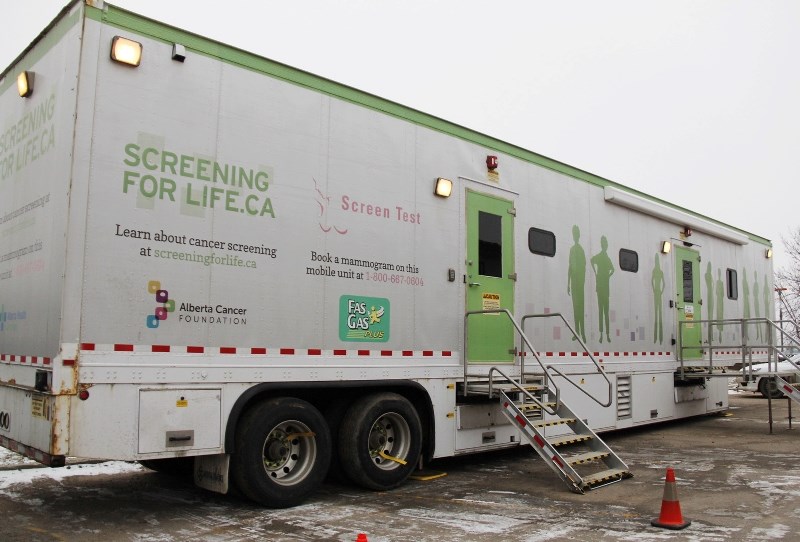Women living in Indigenous communities across the Lakeland are having a vital service brought right to their own backyard.
Screen Test, which is a travelling mammography clinic, will be making stops throughout the month of November.
To start their tour, Screen Test will be offering free mammograms to women of the Elizabeth Métis Settlement on Nov. 6 and 7. Next, it will spend two days on the Cold Lake First Nations Reserve from Nov. 8 to 9.
Women living in Saddle Lake Cree Nation will be next in line with a date of Nov. 14, followed by Kehewin Cree Nation on Nov. 16. Those living in Fishing Lake will also have their turn on Nov. 17.
“We know that women with an Indigenous heritage often are underserved in their own communities. We just want to make sure that they have access to screening similar to women in other rural areas,” said Harmony McRae, community coordinator with Screen Test.
Every year, the mobile mammography clinic travels to over 120 communities, including 25 First Nation and Métis Settlements.
Screen Test offers women ages 50 to 74-years-old free mammogram testing, all they need to do is call and make an appointment. Anyone aged 40 to 49, or anyone over the age of 75, require a referral from their healthcare provider.
“Our target group is women 50 to 74-years-old. That's because they're the ones that are most commonly diagnosed. About 80 per cent of all breast cancer is found in that age group. We really encourage women, even if they have never had one before, to give us a call. They can make their own appointment. They don't have to have a family doctor, and we will see you,” McRae explained. “This makes it easier to get your mammogram done when it comes to your community. You don't have to travel.”
A mammogram is an x-ray of the breasts that helps spot abnormal tissue or changes that may not be seen or felt without the proper equipment. There are two types of mammograms, the first is regular screenings, which is what Screen Test offers. The second are diagnostic mammograms, which are more detail images of any changes in the breast found during a screening.
“Getting mammograms is really important, not just the first one, but making sure that you have regular ones,” McRae said. “When you do get regular mammograms, you can find early changes in the breast tissue that can be a sign of breast cancer. We really recommend taking advantage of this service.”
Your results come in the mail, and are provided to your regular doctor.
“It's really important for your health and it's preventative. We find when we find things early and we treat them earlier, the chances of survival are so much better,” expressed McRae.
On the day of your appointment, McRae recommends arriving five to 10 minutes early in order to fill out the Screen Test questionnaire. They ask that patients wear two-piece outfits, bring their healthcare card, and wear no deodorant the day of.
“The mammogram takes two pictures on each side of the breast. That's about four in total, and it takes only 10-minutes,” noted McRae, adding what is 10-minutes out of your day for the comfort in knowing you have been cleared.
McRae was quick to put to rest the common misconception about the discomfort level associated with getting a mammogram.
“It's not as bad as it used to be. Our technology has gotten a lot better over the last few years. It's really not painful, or it shouldn't be. We can make it as comfortable as our technicians can,” she said.
Breast cancer is the most common form of cancer for women in Canada. This, among other reasons, is why McRae advises women get checked annually.
“It's not going away. We need to make sure we are taking care of ourselves. Women often take care of everyone else before themselves, and we just want to make sure that this is something they can do for themselves to give them a piece of mind.”



